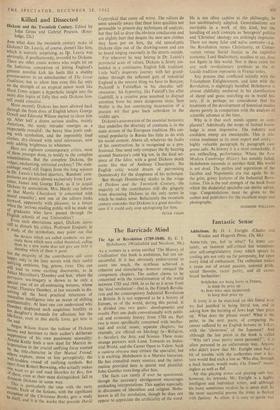The Barricade Mind
The Age of Revolution (1789-1848). By E. J. Hobsbawm. (Weidenfeld and Nicolson, 50s.)
As a venture in a series entitled The History of Civilisation' this book is ambitious, but not un- successful. If it has obviously endeavoured to cover too much, the synthesis achieved is coherent and stimulating—however unequal the component chapters. The author claims to be concerned with the transformation of the world between 1789 and 1848, in so far as it arose from the 'dual revolution'—that is, the French Revolu- tion and the contemporary Industrial Revolution in Britain. It is not supposed to be a history of Europe, or of the world, during this period. It is divided into two parts: developments and results. Part one deals conventionally with politi- cal and economic history from 1780 on. Part two is more specifically concerned with intellec- tual and social issues; separate chapters, for example, are offered on Ideology (a—Religion, b—Secular), the Arts, and Science. These make strange partners with Land, Towards an Indus- trial World, and the Career Open to Talent. Such a camera obscura may irritate the specialist, but it is exciting. Hobsbawm is a Marxist historian. He has consulted many sources, and the infor- mation provided here is quaint and plentiful. John Gunther trots long after him.
The facts can rarely if ever be questioned, though the necessary abridgement encourages misleading interpretations. This applies especially in discussion of liberalism and religion. Hobs- bawm is all for revolution, though he does not appear to appreciate the artificiality of the word.
He is too often captive to the philosophy, he has unobtrusively adopted. Generalisations are inevitable in a work of this kind, but the handling of such concepts as 'bourgeois' politics and 'Christian' ideology are strikingly imprecise. There are many false and naive contrasts--e.g., the Revolution versus Christianity, or Conser- vatism versus Social Justice in the capitalist economy. Lord Shaftesbury, needless to say, does not figure in this world. Nor is there room for any such revolutionary synthesis as the de Gaulle tradition represents in France today.
Any process that conflicted initially with the Triumphant Enlightenment, and later with the Revolution, is slightingly handled. Hobsbawm is almost childishly medimval in his classification of sheep and goats marching on in world his- tory. It is perhaps no coincidence that his treatment of the development of historical studies shows poorly in comparison with the analysis of scientific advance at the time.
Why is it that such minds appear so com- placent? Admittedly the scope of factual know- ledge is most impressive. The industry and confident sweep are inescapable. This is tele- vision treatment, at its most expert and cocky— highly valuable paragraph by paragraph cum grano salis. As history it is a most remarkable, if not enthralling, performance. Where the New Modern Cambridge History has notably failed. Hobsbawm succeeds in another field. His world is not dead. The pathos and aspirations of the Jacobin and Napoleonic era rise again. So do the grim, grimy features of the Industrial Revo- lution. This is the real strength of the book from which the disdainful specialist can derive advan- tage. Congratulations must be given to the author and publishers for the excellent maps and photographs.
DESMOND WILLIAMS






























 Previous page
Previous page